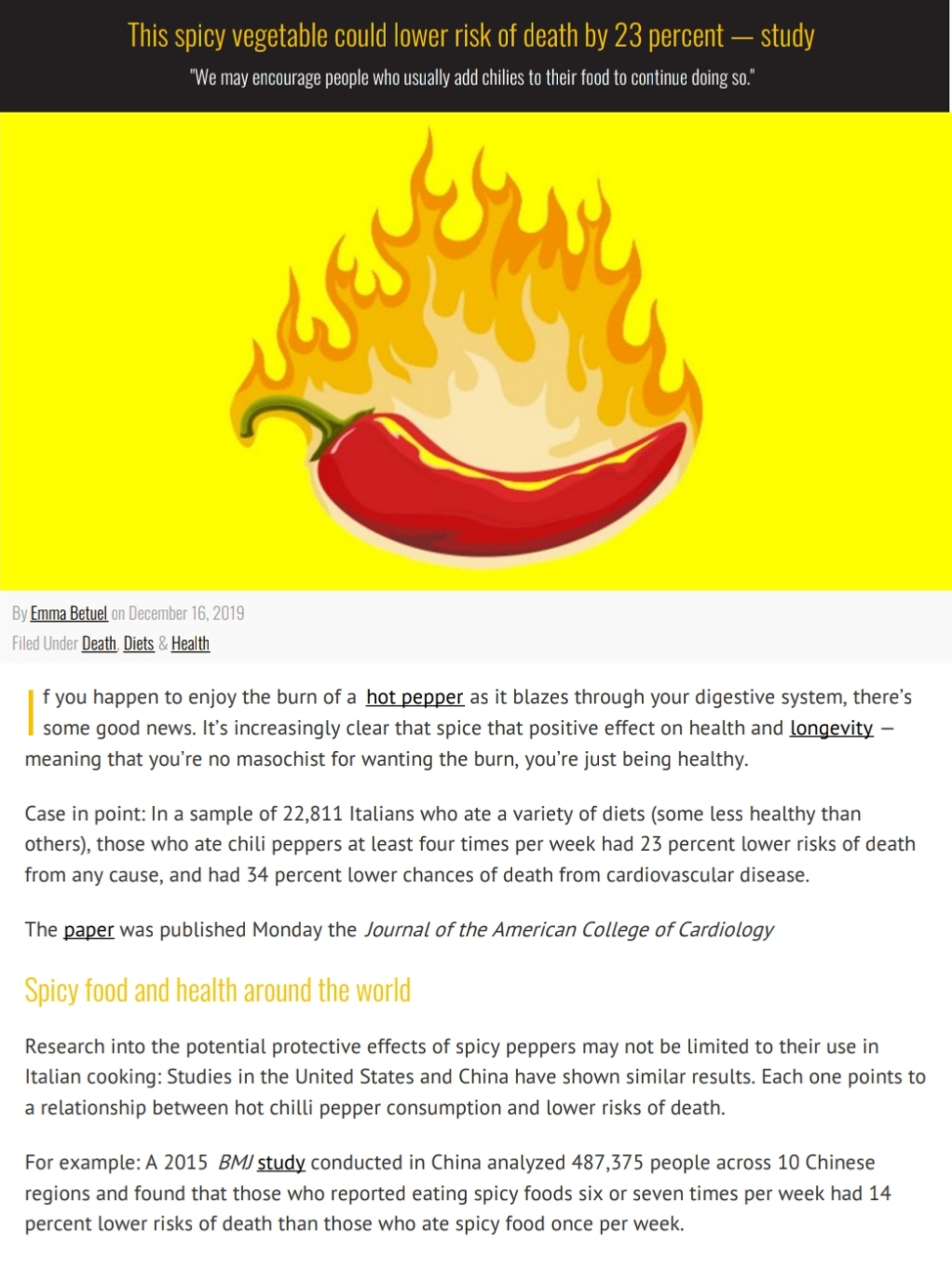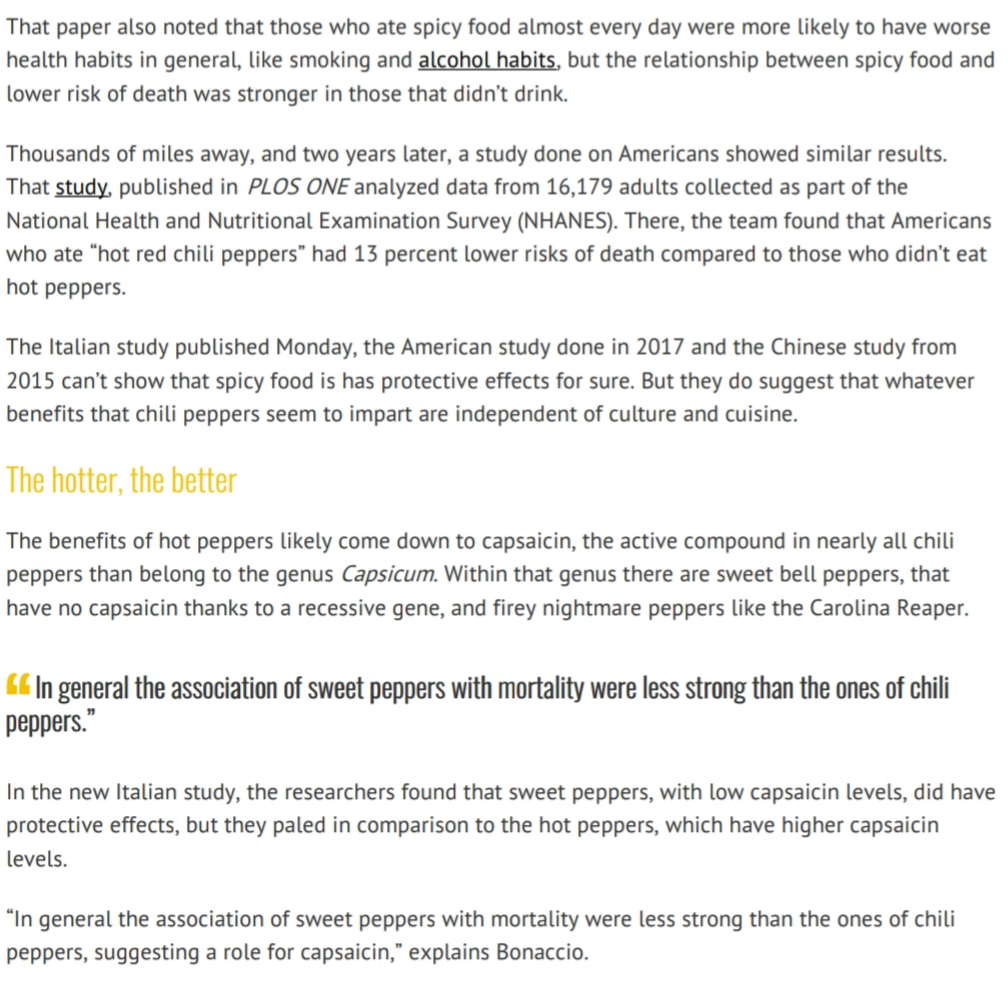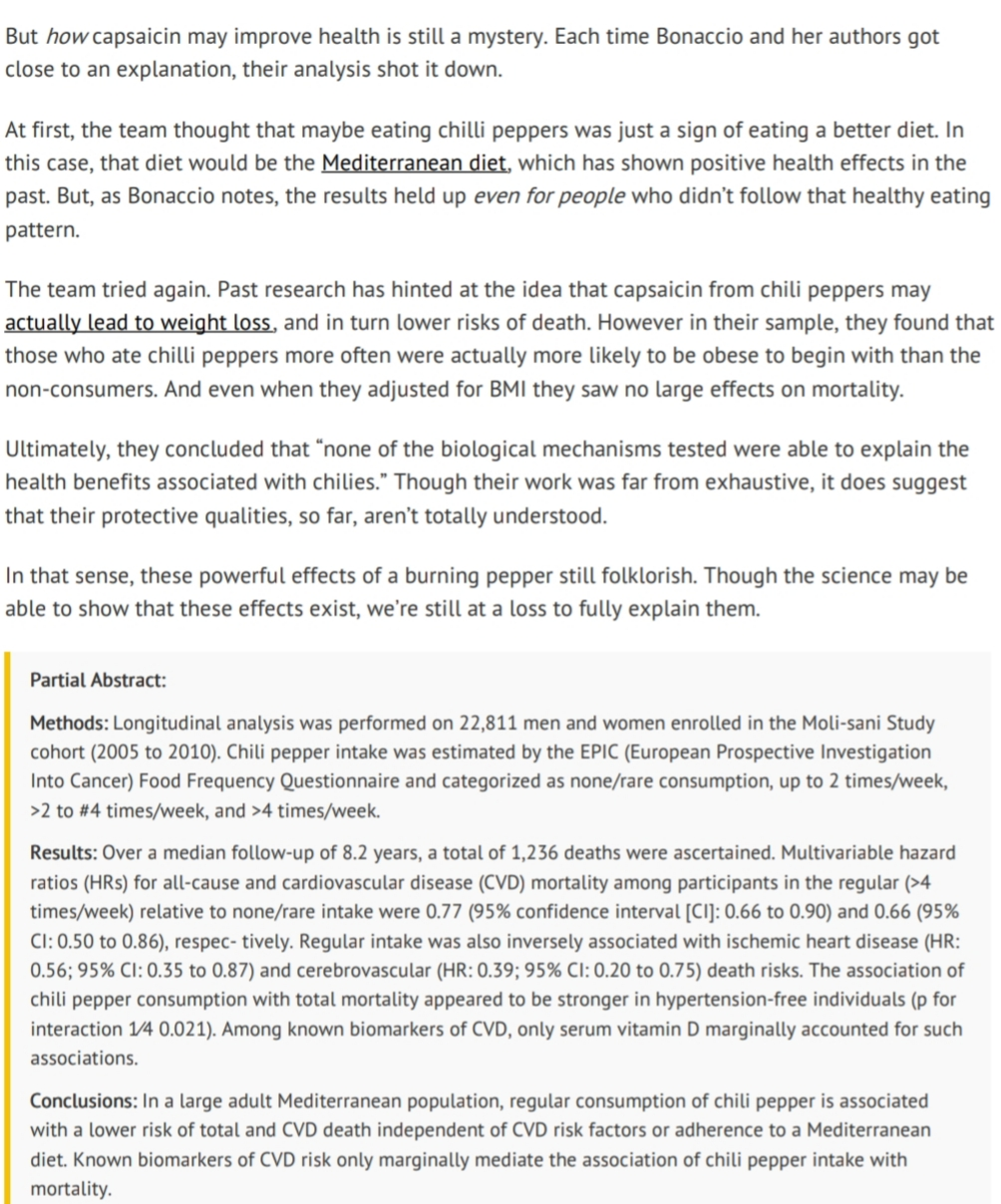Answered step by step
Verified Expert Solution
Question
1 Approved Answer
1. If the main finding involves a test of hypothesis, what is the null hypothesis for that test? Do they have sufficient evidence to reject



1. If the main finding involves a test of hypothesis, what is the null hypothesis for that test? Do they have sufficient evidence to reject that null hypothesis?
2.Can you think of any potential confounder that the researchers did not control for in the study? If yes, explain briefly why it might be a confounder.
This spicy vegetable could lower risk of death by 23 percent study "We may encourage people who usually add chilies to their food to continue doing so." By Emma Betuel on December 16, 2019 Filed Under Death Diets & Health f you happen to enjoy the burn of a hot pepper as it blazes through your digestive system, there's some good news. It's increasingly clear that spice that positive effect on health and longevity - meaning that you're no masochist for wanting the burn, you're just being healthy. Case in point: In a sample of 22,811 Italians who ate a variety of diets less healthy than others), those who ate chili peppers at least four times per week had 23 percent lower risks of death from any cause, and had 34 percent lower chances of death from cardiovascular disease. The paper was published Monday the Journal of the American College of Cardiology Spicy food and health around the world Research into the potential protective effects of spicy peppers may not be limited to their use in Italian cooking: Studies in the United States and China have shown similar results. Each one points to a relationship between hot chilli pepper consumption and lower risks of death. For example: A 2015 BMJ study conducted in China analyzed 487,375 people across 10 Chinese regions and found that those who reported eating spicy foods six or seven times per week had 14 percent lower risks of death than those who ate spicy food once per week. That paper also noted that those who ate spicy food almost every day were more likely to have worse health habits in general, like smoking and alcohol habits, but the relationship between spicy food and lower risk of death was stronger in those that didn't drink. Thousands of miles away, and two years later, a study done on Americans showed similar results. That study, published in PLOS ONE analyzed data from 16,179 adults collected as part of the National Health and Nutritional Examination Survey (NHANES). There, the team found that Americans who ate hot red chili peppers had 13 percent lower risks of death compared to those who didn't eat hot peppers. The Italian study published Monday, the American study done in 2017 and the Chinese study from 2015 can't show that spicy food is has protective effects for sure. But they do suggest that whatever benefits that chili peppers seem to impart are independent of culture and cuisine. The hotter, the better The benefits of hot peppers likely come down to capsaicin, the active compound in nearly all chili peppers than belong to the genus Capsicum. Within that genus there are sweet bell peppers, that have no capsaicin thanks to a recessive gene, and firey nightmare peppers like the Carolina Reaper. Le In general the association of sweet peppers with mortality were less strong than the ones of chili peppers. In the new Italian study, the researchers found that sweet peppers, with low capsaicin levels, did have protective effects, but they paled in comparison to the hot peppers, which have higher capsaicin levels. In general the association of sweet peppers with mortality were less strong than the ones of chili peppers, suggesting a role for capsaicin, explains Bonaccio. But how capsaicin may improve health is still a mystery. Each time Bonaccio and her authors got close to an explanation, their analysis shot it down. At first, the team thought that maybe eating chilli peppers was just a sign of eating a better diet. In this case, that diet would be the Mediterranean diet, which has shown positive health effects in the past. But, as Bonaccio notes, the results held up even for people who didn't follow that healthy eating pattern. The team tried again. Past research has hinted at the idea that capsaicin from chili peppers may actually lead to weight loss, and in turn lower risks of death. However in their sample, they found that those who ate chilli peppers more often were actually more likely to be obese to begin with than the non-consumers. And even when they adjusted for BMI they saw no large effects on mortality. Ultimately, they concluded that none of the biological mechanisms tested were able to explain the health benefits associated with chilies. Though their work was far from exhaustive, it does suggest that their protective qualities, so far, aren't totally understood. In that sense, these powerful effects of a burning pepper still folklorish. Though the science may be able to show that these effects exist, we're still at a loss to fully explain them. Partial Abstract: Methods: Longitudinal analysis was performed on 22,811 men and women enrolled in the Moli-sani Study cohort (2005 to 2010). Chili pepper intake was estimated by the EPIC (European Prospective Investigation Into Cancer) Food Frequency Questionnaire and categorized as none/rare consumption, up to 2 times/week, >2 to #4 times/week, and >4 times/week. Results: Over a median follow-up of 8.2 years, a total of 1,236 deaths were ascertained. Multivariable hazard ratios (HRS) for all-cause and cardiovascular disease (CVD) mortality among participants in the regular (>4 times/week) relative to none/rare intake were 0.77 (95% confidence interval [CI]: 0.66 to 0.90) and 0.66 (95% CI: 0.50 to 0.86), respec- tively. Regular intake was also inversely associated with ischemic heart disease (HR: 0.56; 95% CI: 0.35 to 0.87) and cerebrovascular (HR: 0.39; 95% CI: 0.20 to 0.75) death risks. The association of chili pepper consumption with total mortality appeared to be stronger in hypertension-free individuals (p for interaction 1/4 0.021). Among known biomarkers of CVD, only serum vitamin D marginally accounted for such associations. Conclusions: In a large adult Mediterranean population, regular consumption of chili pepper is associated with a lower risk of total and CVD death independent of CVD risk factors or adherence to a Mediterranean diet. Known biomarkers of CVD risk only marginally mediate the association of chili pepper intake with mortality. This spicy vegetable could lower risk of death by 23 percent study "We may encourage people who usually add chilies to their food to continue doing so." By Emma Betuel on December 16, 2019 Filed Under Death Diets & Health f you happen to enjoy the burn of a hot pepper as it blazes through your digestive system, there's some good news. It's increasingly clear that spice that positive effect on health and longevity - meaning that you're no masochist for wanting the burn, you're just being healthy. Case in point: In a sample of 22,811 Italians who ate a variety of diets less healthy than others), those who ate chili peppers at least four times per week had 23 percent lower risks of death from any cause, and had 34 percent lower chances of death from cardiovascular disease. The paper was published Monday the Journal of the American College of Cardiology Spicy food and health around the world Research into the potential protective effects of spicy peppers may not be limited to their use in Italian cooking: Studies in the United States and China have shown similar results. Each one points to a relationship between hot chilli pepper consumption and lower risks of death. For example: A 2015 BMJ study conducted in China analyzed 487,375 people across 10 Chinese regions and found that those who reported eating spicy foods six or seven times per week had 14 percent lower risks of death than those who ate spicy food once per week. That paper also noted that those who ate spicy food almost every day were more likely to have worse health habits in general, like smoking and alcohol habits, but the relationship between spicy food and lower risk of death was stronger in those that didn't drink. Thousands of miles away, and two years later, a study done on Americans showed similar results. That study, published in PLOS ONE analyzed data from 16,179 adults collected as part of the National Health and Nutritional Examination Survey (NHANES). There, the team found that Americans who ate hot red chili peppers had 13 percent lower risks of death compared to those who didn't eat hot peppers. The Italian study published Monday, the American study done in 2017 and the Chinese study from 2015 can't show that spicy food is has protective effects for sure. But they do suggest that whatever benefits that chili peppers seem to impart are independent of culture and cuisine. The hotter, the better The benefits of hot peppers likely come down to capsaicin, the active compound in nearly all chili peppers than belong to the genus Capsicum. Within that genus there are sweet bell peppers, that have no capsaicin thanks to a recessive gene, and firey nightmare peppers like the Carolina Reaper. Le In general the association of sweet peppers with mortality were less strong than the ones of chili peppers. In the new Italian study, the researchers found that sweet peppers, with low capsaicin levels, did have protective effects, but they paled in comparison to the hot peppers, which have higher capsaicin levels. In general the association of sweet peppers with mortality were less strong than the ones of chili peppers, suggesting a role for capsaicin, explains Bonaccio. But how capsaicin may improve health is still a mystery. Each time Bonaccio and her authors got close to an explanation, their analysis shot it down. At first, the team thought that maybe eating chilli peppers was just a sign of eating a better diet. In this case, that diet would be the Mediterranean diet, which has shown positive health effects in the past. But, as Bonaccio notes, the results held up even for people who didn't follow that healthy eating pattern. The team tried again. Past research has hinted at the idea that capsaicin from chili peppers may actually lead to weight loss, and in turn lower risks of death. However in their sample, they found that those who ate chilli peppers more often were actually more likely to be obese to begin with than the non-consumers. And even when they adjusted for BMI they saw no large effects on mortality. Ultimately, they concluded that none of the biological mechanisms tested were able to explain the health benefits associated with chilies. Though their work was far from exhaustive, it does suggest that their protective qualities, so far, aren't totally understood. In that sense, these powerful effects of a burning pepper still folklorish. Though the science may be able to show that these effects exist, we're still at a loss to fully explain them. Partial Abstract: Methods: Longitudinal analysis was performed on 22,811 men and women enrolled in the Moli-sani Study cohort (2005 to 2010). Chili pepper intake was estimated by the EPIC (European Prospective Investigation Into Cancer) Food Frequency Questionnaire and categorized as none/rare consumption, up to 2 times/week, >2 to #4 times/week, and >4 times/week. Results: Over a median follow-up of 8.2 years, a total of 1,236 deaths were ascertained. Multivariable hazard ratios (HRS) for all-cause and cardiovascular disease (CVD) mortality among participants in the regular (>4 times/week) relative to none/rare intake were 0.77 (95% confidence interval [CI]: 0.66 to 0.90) and 0.66 (95% CI: 0.50 to 0.86), respec- tively. Regular intake was also inversely associated with ischemic heart disease (HR: 0.56; 95% CI: 0.35 to 0.87) and cerebrovascular (HR: 0.39; 95% CI: 0.20 to 0.75) death risks. The association of chili pepper consumption with total mortality appeared to be stronger in hypertension-free individuals (p for interaction 1/4 0.021). Among known biomarkers of CVD, only serum vitamin D marginally accounted for such associations. Conclusions: In a large adult Mediterranean population, regular consumption of chili pepper is associated with a lower risk of total and CVD death independent of CVD risk factors or adherence to a Mediterranean diet. Known biomarkers of CVD risk only marginally mediate the association of chili pepper intake with mortalityStep by Step Solution
There are 3 Steps involved in it
Step: 1

Get Instant Access to Expert-Tailored Solutions
See step-by-step solutions with expert insights and AI powered tools for academic success
Step: 2

Step: 3

Ace Your Homework with AI
Get the answers you need in no time with our AI-driven, step-by-step assistance
Get Started


